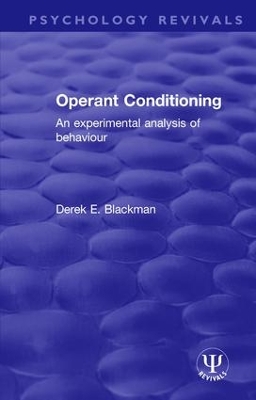Manual of Modern Psychology S.
1 total work
The approach to psychology advocated by the radical behaviourists was often misunderstood and frequently gave rise to controversy. Originally published in 1974, this book introduced current research in operant conditioning and explains the attempt to understand behaviour inherent in such experiments at the time. After considering the philosophical context in which behaviouristic psychology developed, the author outlines the basic characteristics of operant research by reviewing single experiments on the effects of reinforcement on behaviour. Chapters on schedules of intermittent reinforcement extend this approach to more complex situations and emphasize that behaviour can be maintained and controlled in many different ways by environmental events.
The author then discusses recent work on conditional reinforcement and on the discriminative control of behaviour and shows how operant research has changed our understanding of these important concepts in psychology. Subsequent chapters review research within the operant paradigm on the effects on behaviour of punishment, anxiety, aversive stimuli and drugs, again by emphasising the special contribution to these topics made by operant conditioning techniques and methodology. The final chapters consider the general implications of operant research for educational practice and for clinical psychology, and place this approach within the context of psychology as a whole. Dr Blackman argues that it should be recognized as one important attempt to further the scientific analysis of behaviour.
This book, filled a long recognized need for an undergraduate text in this area at the time, and helped students form their own evaluation. Now it should be read in its historical context.
